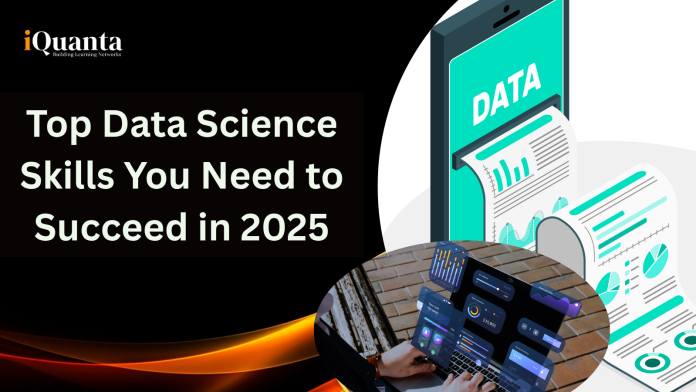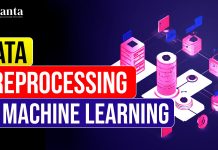Data is everywhere in this current era. From personalized recommendations on Netflix to real-time traffic updates on Google Maps, data is driving the world around us. As organizations across industries collect more data than ever before the need for skilled professionals who can analyze, interpret, and extract insights from that data has skyrocketed. This is where data science skills come into play.
Whether you are a student exploring career option or a working professional planning a transition and someone simply curious about the field but building strong data science skills is essential for staying relevant in 2025 and beyond. However the path can be interesting since there are so many tools, technologies, and concepts to learn.
This blog will help you understand what data science skills actually are and why they are so important and which ones are in high demand. You will also learn how to acquire these skills effectively, avoid common pitfalls, and stand out in a competitive job market.
What are Data Science Skills?
Data science skills refer to the combination of technical abilities and analytical thinking required to extract meaningful insights from large volumes of data. These skills allow professionals to collect organize clean analyze and visualize data to help businesses make better decisions.
At the core of data science skills are programming knowledge mathematical understanding and domain expertise. A typical data scientist might write code in Python or R use SQL to query databases apply statistical models to find patterns and use visualization tools to present results in a simple and understandable way.
But it is not just about technical tools. Critical thinking communication and problem solving are also key parts of the skill set. Being able to explain complex insights to non technical stakeholders is just as important as building a machine learning model. In short data science skills are what enable someone to turn raw data into real value for a company product or project.
| Region | Entry Level (0–2 yrs) | Mid Level (2–5 yrs) | Senior Level (5+ yrs) |
| United States | $85,000 – $110,000 | $115,000 – $145,000 | $150,000 – $200,000 |
| India | ₹6 LPA – ₹10 LPA | ₹12 LPA – ₹20 LPA | ₹22 LPA – ₹40+ LPA |
| United Kingdom | £35,000 – £50,000 | £55,000 – £75,000 | £80,000 – £120,000 |
| Germany | €45,000 – €60,000 | €65,000 – €90,000 | €95,000 – €130,000 |
| Canada | CAD 70,000 – 90,000 | CAD 95,000 – 120,000 | CAD 125,000 – 160,000 |
| Remote (Global) | Varies by company | Often competitive | High for specialized roles |
Why Are Data Science Skills Important in 2025?
We live in a world where data is growing fast. From mobile apps to large businesses everyone collects data every second. Companies want to use this data to make better decisions, improve products, and serve customers in smarter ways. That is why data science is becoming more important every year.
In 2025 companies will continue to hire people who can understand data and turn it into insights. This means they want people with strong data science skills. If you can clean data, find patterns and explain results clearly then you will be in demand.
These skills help you solve real problems. For example you can help a business know why sales are dropping or help a hospital predict which patients need urgent care. Your work can make a big difference. Because of this value data scientists are paid well.
Top 10 Data Science Skills You Must Master
To succeed in data science in 2025, you need more than just basic knowledge. You must build a strong mix of coding skills, statistical thinking, and business understanding. Below are the top 10 skills every data science professional should focus on.
Python Programming
Python is the most used language in data science. It is simple, flexible, and has powerful libraries like Pandas, NumPy, Scikit-learn, and Matplotlib. Learning Python is often the first step for anyone starting in this field.
SQL and Databases
Data is often stored in databases. SQL helps you pull the exact data you need. Knowing how to write SQL queries is a key part of daily work for data analysts and scientists.
Data Cleaning and Preparation
Raw data is messy. You must learn how to clean and prepare it before analysis. This includes handling missing values, fixing errors, and reshaping data. Clean data leads to better insights.
Statistics and Probability
A solid understanding of statistics helps you make sense of data. Concepts like distributions, mean, variance, hypothesis testing, and confidence intervals are all important in building models and drawing conclusions.
Machine Learning Basics
Machine learning helps you build models that can predict outcomes. You should understand the basic algorithms such as linear regression, decision trees, random forests, and clustering methods.
Data Visualization
Charts and graphs make data easy to understand. Tools like Matplotlib, Seaborn, Power BI, or Tableau help you turn complex numbers into clear stories. Visualization is key when sharing your findings.
Big Data Tools
As data grows, you may need tools like Hadoop, Spark, or cloud platforms such as AWS and Google Cloud. These help you process large volumes of data faster and more efficiently.
Version Control with Git
Git lets you track changes in your code and work with teams smoothly. It is a must-have skill in any modern data science workflow.
Business Understanding
Data science is not just about numbers. You must understand the business goals behind the data. Knowing what questions to ask is often more valuable than finding fancy answers.
Communication Skills
You need to explain your findings to people who do not know code or statistics. Clear communication helps you make a bigger impact and work better with others.
Bonus Skills That Give You an Edge
Once you have built your core data science skills then it helps to go beyond the basics. These bonus skills are not always required but can set you apart in a competitive job market. They show that you are not just a data scientist you are a problem solver, a thinker, and a leader.
Deep Learning and Neural Networks
Deep learning powers technologies like image recognition, natural language processing, and recommendation systems. If you’re interested in advanced AI, learning tools like TensorFlow and PyTorch will give you a big advantage.
Natural Language Processing (NLP)
NLP lets machines understand and work with human language. This is useful for building chatbots, summarizing text, and analyzing customer reviews. It’s one of the fastest-growing areas in data science.
Time Series Analysis
Many businesses want to forecast future trends. Time series skills help you analyze data that changes over time, like stock prices, sales data, or website traffic.
Cloud Computing Skills
Knowing how to use cloud platforms like AWS, Google Cloud, or Azure helps you scale your data projects. You can store big data, train models faster, and deploy them with ease.
MLOps and Model Deployment
It is not enough to build a model then you need to put it into action. MLOps is about managing machine learning models in real world environments. Knowing how to deploy, monitor, and update models adds real value.
How to Learn These Data Science Skills
Learning data science can seem to be amazing at first. But with the right approach and tools, you can build your skills step by step. Whether you are a student, a working professional, or switching careers. Here is a roadmap to help you get started and stay on track.
Start with the Basics
Begin with Python and SQL. These are the foundations of data science. Use free resources like YouTube tutorials, coding platforms like Codecademy or Kaggle, or beginner friendly courses on Coursera and Udemy.
Follow a Structured Learning Path
Stick to a clear roadmap. Many learners get lost because they try to learn everything at once. Follow a path that starts with data analysis and then moves into statistics, machine learning, and data visualization.
Practice on Real Projects
Apply what you learn. Join platforms like Kaggle, DataCamp, or GitHub to work on real-world problems. You can analyze public datasets or build small projects like dashboards, recommendation systems, or prediction models.
Join Online Communities
Communities like Reddit, Stack Overflow, and LinkedIn groups are great for support and motivation. You can ask questions, share your work, and learn from others who are also on the same path.
Stay Updated with Trends
Follow blogs, newsletters, and influencers in the data science space. The field changes quickly. Staying updated helps you learn about new tools and methods that employers are looking for.
Build a Portfolio
Create a GitHub profile or a personal website to showcase your projects. Recruiters often look at real examples of your work. A strong portfolio can help you stand out, even if you are new to the field.
FAQs
What are the most important data science skills for freshers?
For beginners, the key skills to focus on are Python, SQL, basic statistics, and data visualization. Learning how to clean and analyze data is essential. Understanding tools like Pandas, Matplotlib, and basic machine learning concepts will give you a strong foundation.
Can I learn data science skills without a tech background?
Yes, you can. Many successful data scientists come from non-technical backgrounds such as business, finance, or biology. Start with beginner-friendly resources and build your skills step by step. A willingness to learn and practice is more important than your starting point.
How long does it take to master these skills?
It depends on your pace and commitment. If you study consistently for 1 to 2 hours a day, you can gain a good grasp of the basics in 4 to 6 months. Becoming job-ready may take 9 to 12 months, especially if you’re working on real projects and building a portfolio.
Is Python enough for data science?
Python is one of the most popular and versatile languages for data science. For many roles, knowing Python along with libraries like NumPy, Pandas, and Scikit-learn is enough to get started. However, it’s often paired with other skills like SQL and data visualization tools.
Which data science skills are most in-demand in India
In India, employers look for skills in Python, SQL, machine learning, and tools like Power BI or Tableau. There is also growing demand for cloud platforms such as AWS and Azure, and experience with deep learning or NLP can be a big plus.
Should I focus on tools or concepts first?
Start with concepts. Understanding how data works and how to analyze it is more important than learning tools in isolation. Once your foundation is strong, learning tools like Excel, Tableau, or specific machine learning libraries becomes much easier.
Do I need to learn deep learning from the beginning?
Not at all. Deep learning is an advanced area. It’s better to first understand basic machine learning and data analysis. Once you are comfortable with those, you can explore deep learning if your career path demands it.
Conclusion
Data science continues to be one of the most in-demand and rewarding career paths in 2025. Whether you are just starting out or looking to upgrade your skills, focusing on the right areas can make a big difference. Start with the fundamentals like Python, SQL, and basic statistics. Then move on to machine learning, data visualization, and real-world projects. Stay curious, keep practicing, and build a strong portfolio to stand out to employers.
Remember that you do not need to learn everything at once. Consistent learning and application are the keys to success in data science. With the right mindset and resources, you can grow your skills and open doors to exciting opportunities in this fast-growing field.






![Top 10 Applications of Linked List Data Structure [2025]](https://www.iquanta.in/blog/wp-content/uploads/2025/02/WhatsApp-Image-2025-02-01-at-2.48.42-PM-218x150.jpeg)

